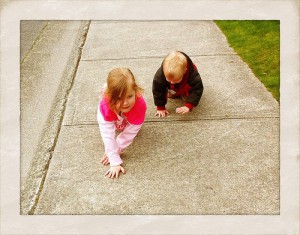Yesterday evening I had the chance for a night out of the house on my own. Today, I’m recalling another evening a number of years ago when I really wanted a night out, but I wasn’t in the place to make it happen. Let’s compare and contrast those two evenings.
Yesterday Evening
- My children were three-and-a-half and seven years old.
- Both children were sleeping through the night.
- Both children had experience being put to bed by someone other than me.
- Their loving father felt confident taking charge for the evening.
- I was working from home, so I had lots of time with my kids during the day.

My children now
Long-Ago Evening
- I had one child who was about eighteen months old.
- That child still nursed to sleep every night.
- That child also still woke up regularly after falling asleep.
- Her father, while very loving, did not feel confident putting her to sleep without me.
- I was working outside of the home, and wanted to minimize other separations.

My daughter then
On that long-ago evening, though, things were less clear to me. While I decided not to go out, I felt some pressure around that decision. Many of my friends and acquaintances often took nights away from their own toddlers. I was receiving some subtle messaging that my decision to spend my evenings with my daughter was harming both her and me in some way. We’re often told that it’s important for moms to get away for the evening, or maybe even overnight. When everyone else seems to be doing it, we may feel sheepish that we don’t.
It’s important for me to pause at this point and acknowledge that every situation is different. Some children are just fine being put to sleep by their father or another trusted adult from a very young age. But some children aren’t. Attachment Parenting International talks about the importance of providing consistent and loving care. That’s going to look different in different families. The important thing isn’t when the separation occurs, or how often it occurs. The important thing is that we do our best to respect everyone’s needs, and that we feel free to do what we know is right for our families.
It can feel stifling to be at home with a baby when it seems like everyone else is going out. But as I’ve learned in my years of parenting, children grow. In fact, they grow at a pace the feels alarmingly fast. If you’re not ready to take that night out on the town yet, take heart. Your day will come. Mine came yesterday evening, when I put on a fancy dress, kissed everyone good-bye, and enjoyed myself with my friends. My family was ready, I was ready, and I was able to really relax and have a good time because I had confidence in the situation. For me, that’s worth its weight in gold.
What about you – did you ever find yourself staying home with your child while everyone else went out because you weren’t yet ready for that kind of separation? And how did you know when you and your child were ready to be apart for the evening? I’d love to hear your thoughts.
You can catch up with Amber’s other adventures on her blog at Strocel.com.








